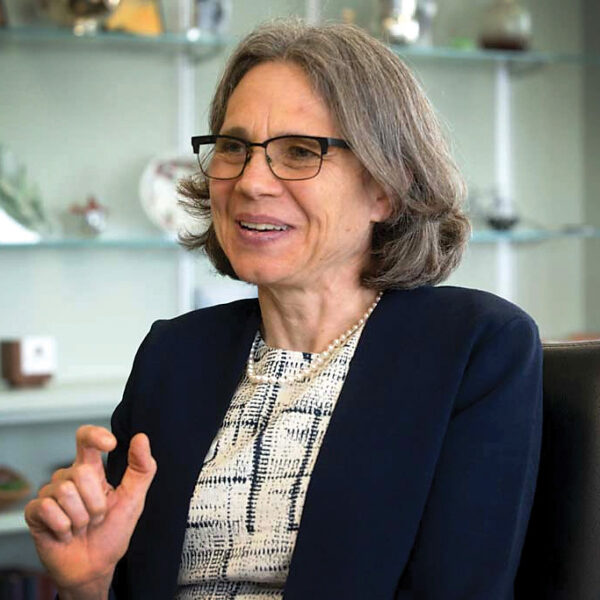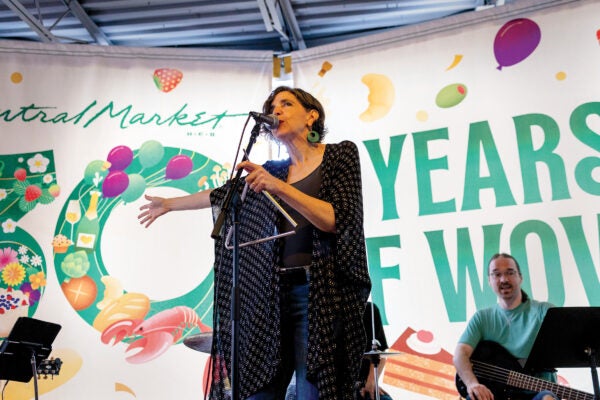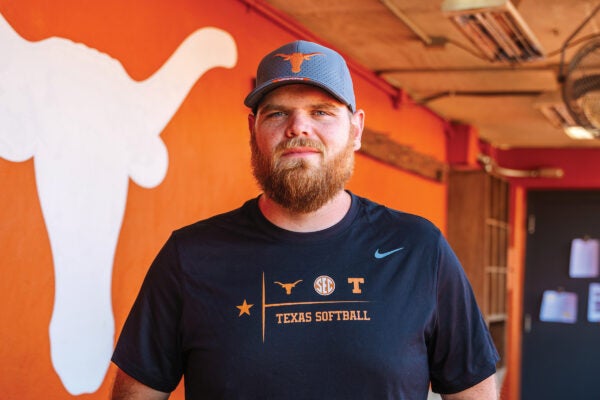Sharon Wood does not start her day with coffee; she gave up caffeine during her undergraduate days. Instead, she starts by running or cycling. This will not surprise anyone who knows the hardworking, early-rising engineer who became UT’s executive vice president and provost on July 19.
Wood grew up in central New Jersey with a father in construction.
“When I was a little kid, he was working for a contractor who built industrial steel structures — and that’s how I got interested in structural engineering. When I was about 8, I got to walk around on the construction site and up in the beams, and I thought that engineering would be fun,” she says. “During the recession in 1972, he started an asphalt paving company, and that’s where he spent most of his career. I did work for him the summer after my first year of college. The asphalt is 300 degrees below you, it’s hot above you, and it’s a demanding physical job. The experience convinced me to spend a lot of time studying!”
She is proud to be a fourth-generation civil engineer; her father, grandfather and great-grandfather were all in the trade. The fact that she is the first woman in that professional genealogy bestows a certain pioneer status on her, and having become a leader in a historically male-dominated field has not gone unnoticed. She was named dean of the Cockrell School of Engineering in 2014 after serving several months as interim dean.
We spoke in her office on June 30, with a moving box here and there in her waning days as dean. Parts of this interview have been edited for clarity and length.
Listening is really important, and that’s one of the big things that’s missing from society right now.
What is different about an engineer’s mindset from that of other disciplines? Are there generalizations you can make about it?
I think there is something about engineers. You see a huge challenge ahead of you, and what do you do? You start breaking it down into problems that you can approach. I think that’s the key part. You don’t get overwhelmed. You start with, how am I going to put the pieces together and try to solve it? That’s probably the part of the mindset that I see in common among engineers.
Do you feel like there is synergy between you and President Jay Hartzell in that approach, or are your approaches to problem-solving complementary?
I think they are very complementary. I’ve served on a number of committees with President Hartzell, and we also worked closely together to develop a joint honors program between business and engineering. It’s interesting, because we do come at things from different perspectives and have different thought processes, but we end up with the same solutions quite often.
The provost has such a huge portfolio. What are the mental buckets you use to keep all this stuff straight, all the areas you have to manage and advance?
I put them in three big buckets. First is the deans. Those are the people I’ve worked most closely with as peers. When I’d listen to their perspectives as a peer, I’d say, “OK, I get it,” but I’d also think, “I’ve got my own problems I have to focus on.” So I have to change, now that I’m provost, to understand the depth of their problems and how can we work together to improve excellence across campus.
Then there are all the offices led by senior vice provosts and vice provosts. As a dean,
I have worked extensively with Faculty Affairs on promotion and tenure and also any type of issue related to the faculty. I have also worked closely with Resource Management. I haven’t been as directly engaged with Enrollment Management, though I certainly have worked with them. I’ve worked with the Registrar and Texas Global. I would say those two buckets I understand well.
And then we have UT Libraries, the Harry Ransom Center, Blanton Art Museum, the Briscoe Center and UT Press — where I’ve had passing interactions but don’t necessarily know the depth yet. I look forward to learning more about these groups because they’re extraordinary and they make UT unique.
I’ve looked at the Provost’s Office’s strategic priorities and the way the office is currently organized and want to do just a free association with you around some topics. Let’s start with diversity.
It’s an issue of great importance. We have become more diverse through the years. Certainly if I compare the student body when I was an undergrad (at the University of Virginia) with what we have now, it is much more diverse, but we clearly have room for improvement. And our faculty and staff community needs to be more diverse also. Our students are looking for role models. So it’s something we’ve placed a great deal of focus on here in the Cockrell School, but the Provost’s Office has given us the opportunity to be very aggressive in hiring. That will continue to be a priority, and working with that team closely is going to be very important for all the deans.
I suppose that dovetails to an extent with Enrollment Management …
That’s right. President Hartzell has a strategic planning effort going on right now. One of the key questions is how large should the university be? It’s been roughly 51,000 students since I got here 25 years ago. Right now, Enrollment Management is crafting a class for us, but if we grow, do we have more flexibility? How do we do that? What is the right size for UT? These are all important questions to explore and analyze over the coming years.
And Resource Planning and Management …
This is really important. Because if you talk to any dean, they always want a new building, or they need to renovate space. We’re trying to do things more efficiently, planning a couple steps ahead so that we know in advance what the plan is for building replacement. Another big issue with resource management is that former Provost Maurie McInnis set up a five-year plan for faculty hiring, and we’re at the end of that, so we need to develop a new model that strategically aligns with the needs of the schools and colleges. This will be a priority in the coming year.
What are your thoughts around undergraduate academic affairs, including experiential learning and UT for Me?
One of the things (former) President (Greg) Fenves did was raise the importance of the residential four-year education, which differentiates us from online universities. Then, of course, we went all online! That was a challenge. Our students want to be back to working in teams and working in these experiential opportunities. That’s one of the things they’ve really missed, and while some of these experiential learning classes have continued, they’re still doing it over Zoom, and it’s not the same as being in person, being able to do things together.
UT for Me, our partnership with the Dell Foundation, has some really ambitious goals for the students they’re supporting. I met with them for the first time in mid-June, and I think we do need to think differently about how we can work more closely with them now that everyone’s coming back to campus.
Big question: On both the right and the left today, we see strong currents of anti-intellectualism. What do you see as a university’s role in society with regard to defending expertise and defending the respectful exchange of ideas?
One of the fundamental concepts of universities is that faculty have the ability to pursue ideas based on their individual interests. I think if we lose that, we lose the glue that holds the university together.
I devoted a large portion of my career to professional service — it was something that I enjoyed. Now, I realize that it really was important, because you have to listen, and you have to think about how to talk together rather than talking at each other. That’s an experience I’ve had that many of my colleagues haven’t. It’s very easy to say, “My research is right, and I’m just going to continue doing it.” But if you want to have it be applied in practice, you have to be able to talk to a much broader group of people.
The ability of faculty members to pursue their own ideas is fundamental. That’s why most of us became faculty members, and that opportunity set a career path for us. But we have to try to instill a belief in the students about the value of listening and trying to understand. That doesn’t mean you don’t challenge — asking questions is how we learn. But listening is really important, and that’s one of the big things that’s missing from society right now. We have to get that back.



